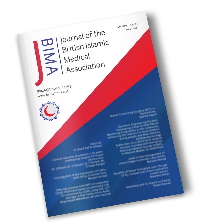
Assalamo Alaikom
The increase on the focus of issues within Islamic bioethics is a welcome development, and this month (December) alone, 3 Islamic medical conferences have taken place. Our BIMA conference in Birmingham, the conference in Istanbul (Turkey) which focused on the Fatwa-making for medical issues, and the conference on bioethics and Islamic perspective in Toronto (Canada). These conferences have stimulated significant discussion on the Islamic rulings on various medical issues and have inspired others to lead research to understand these areas better. When one speaks of Islamic bioethics, it is usually regarding the rulings of Islam towards biomedical challenges and the advancement of medicine; as well as the beginning and end of life. It is imperative for us to study how the fatwa rulings develop in these areas as society develops.
There is one area in Islamic bioethics which seems to be slightly neglected however; the importance of the patient – physician relationship. This is a crucial area of understanding and determines the success of the physician. The required character of the Muslim physician is high though this does not seem to be as well understood. Perhaps this is due to the assumption that a physician should be of the best character anyway. Interestingly, it is the literature written by prominent Muslim physicians that has influenced this as will be set out below.
A Muslim physician should be talented and knowledgeable. These qualities are obvious of course, but a Muslim physician’s knowledge should not merely extend to medicine alone. He should be well read about the world around him and have a basic understanding of other disciplines. After all, medicine does not exist in a vacuum; it is not an isolated profession and a patient who will be unwell may have a number of aggravating factors that relate to different disciplines.
It is of course imperative that a Muslim physician be of good character and be trustworthy and honest with his patients. He should be just and fair and not treat any patient with an element of favouritism. Whilst he will prioritise the most severe cases, those which are less severe should not be forgotten about and dismissed. The physician has a fundamental duty of care towards patients and it is critical that this duty is upheld at all times. Confidentiality of the patient has to be respected. A Muslim physician should not bring the medical profession into disrepute through his poor character.
A Muslim physician should present himself well but remain modest too. It is a mark of respect towards one’s patients to be dressed and groomed appropriately though the clinic and hospital are not fashion parades. Remembering that some patients may not be as wealthy as the physician is important; the physician is their peer and should – to a certain extent – look and dress like them. This helps him be seen in a positive light.
There is a duty towards the Muslim physician to respect their colleagues’ specialties. Everyone’s knowledge is finite; no individual is an expert in every speciality and a good physician should be humble enough to understand that there will be medical areas where he should defer to his colleagues’ judgement. The medical field is a broad sphere after all.
Furthermore, a Muslim physician has a duty towards his students is to not be secretive with his knowledge and share it to improve the lives of others. There is little use of such knowledge being gained through extensive research and practice if it is not shared. The physician’s students will take over from him one day; it is their right to be taught in the best possible way. As previously mentioned, he is instructed to be humble and should not be shy in seeking their input and knowledge even though they are students. He should be tactful in criticising them (and not do so in front of their peers) and avoid humiliating them.
The Muslim physician’s duties towards his elders (amongst physicians and those of other disciplines) is to respect them unconditionally but to advise sincerely without fear when they are wrong. His duties towards society are to help with health promotion and public health campaigns. He should play a part in raising awareness of various health concerns affecting the society of the time.
And ultimately, a Muslim physician’s duties towards humanity are to help facilitate aid and relief campaigns towards disaster stricken areas around the world and to take part in research towards cures. Disease does not discriminate between the old and young. Rich and poor. Black and white. A Muslim physician is capable of making a difference to millions around the world he will never meet with work in research and in aid relief.
Whilst the General Medical Council places a lot of emphasis on these qualities within the revalidation process and 360 reviews as well as the yearly appraisals, it is clear that Muslim physicians have been doing this for centuries. The book (Adab Al Tabib) Ethics of Physician by Rahawi in the 9th century and also Al Razi in his book (Akhlaq Al- Tabib) Manners of Physician, touch on these issues in such detail. It is another example of Islamic practice leading the way, centuries in advance.
JBIMA encourages papers on this in the future and strives to ensure there is more awareness of the importance of the character of the Muslim physician and his good relationship with the patient.
Very best wishes,
Wassalam.
Dr Sharif Kaf Al-Ghazal
JBIMA, Editor in Chief

